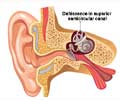Minor head injuries may cause a temporary loss of smell and affective problems such as anxiety and depression, finds a new study.

In a study published in Brain Injury, an international team led by Université de Montréal neuropsychologists compared 20 hospital patients who had mild concussions to 22 who'd broken limbs but had no concussion. Within 24 hours of their accident, just over half of those with mild concussions had a reduced sense of smell, versus only 5 per of the patients with broken bones. A year later, although their sense of smell was back to normal, the first group of patients had significantly more anxiety than the control group.
"A lot of people will suffer a mild concussion at some point in their life, so realizing they have trouble smelling is the first step to telling their doctor about it," said lead author Fanny Lecuyer Giguère, who did the research as part of her doctoral thesis in neuropsychology supervised by UdeM associate professor of psychology Johannes Frasnelli. "It's important that patients report any loss of smell, because it's not something their general practitioner or emergency-room physician normally asks about."
Identifying the problem is a short step to getting personalized treatment, she added, with closer follow-up to see if the loss of smell and anxiety persist, indicating the severity of the injury. Physicians should also educate their patients so that they check whether symptoms crop up in the weeks following their accident, she said. "It's a question of raising awareness: the more people are told to watch for signs of olfactory loss and anxiety, the easier it will be for doctors to respond."
To test their capacity to identify smells, Lecuyer Giguère visited hospital patients in the alpine ski resort of Visp, Switzerland between December 2016 and February 2017. Almost all those with mild concussions had had a skiing accident. They were all seen within the first 24 hours following their accident, as were those with fractures but no concussion. With scented "Sniffin' Sticks' (felt-tip pens) to smell, they were asked to identify synthetic odors of roses, garlic, cloves and solvent, and more.
A year later, the patients were sent a follow-up questionnaire and a set of scratch-and-sniff booklets. By comparing the two groups of patients' results in the day following their injury and 12 months later, the researchers were able to determine that most who'd lost their sense of smell gained it back within six months of their accident.
Advertisement
Future studies should look at a larger sample of patients to better examine the association between anxiety and olfaction, the authors concluded.
Advertisement
Source-Eurekalert















